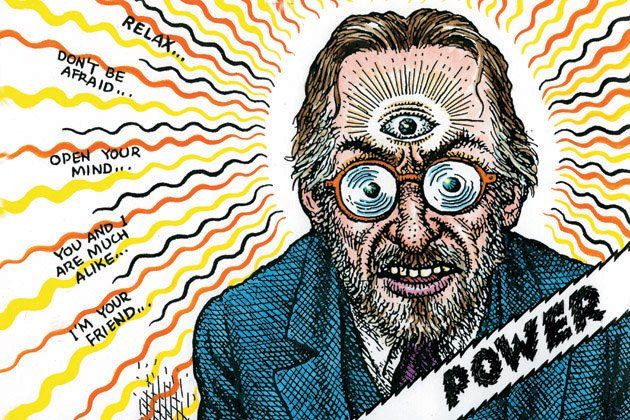
R. Crumb is talking about himself again. On his Web site—he doesn't run it, but he does contribute—there's a new interview conducted this summer called "Hey, I'm Still Here ..." There are also newly posted essays, one by Crumb about his experience with LSD and its effect on his art back in the '60s, and another by his brother Maxon about the young Crumb brothers' first encounter with Treasure Island, the Robert Newton movie version. Both have appeared previously, but this version of Maxon's essay is now uncut. Crumb fans will eat up every scrap. As for the uninitiated among you—and surely the bestselling status of Crumb's recent illustrated version of the Book of Genesis earned him new legions—here's a good place to start, Matey.
Why do Crumb's fans obsess over him so much? I'm not sure, but I think it's because he has so thoroughly blurred the line between the life and the art. (No wonder the late Harvey Pekar looked to Crumb as his first illustrator when Pekar began writing his life's stories in what would become American Splendor.) Certainly Crumb has never made a secret of his private life (although he has insisted on having one—for the better part of two decades he's lived a secluded, if not exactly hermetic, life in rural France). He's spent his career chronicling his own misadventures and the darker corners of his psyche—sometimes even a fan can catch himself saying, I really know way too much about Crumb's passion for women with big rear ends.
The man who first became known for his underground comic creations (Mr. Natural, Flakey Foont, Fritz the Cat) has never hesitated to let us in on his private dramas. Nor has he barred the door to interviewers and filmmakers. No family could ask for a more probing examination than the one Crumb and his brothers received in Terry Zwigoff's wonderful documentary Crumb (which, by the way, left its audiences with the slightly unsettling realization that Robert is the most normal Crumb).
Nevertheless, we crave more. Perhaps it's because Crumb rewards this craving so well. He has the knack, on paper and in interviews, of being shockingly honest without sounding like a headline hunter. Sometimes it's like listening to America's id unchecked. Other times, it's like running into a grumpy old man on a park bench who turns out to be a genius. In the new interview he's asked by his interlocutor, Alex Wood, what he misses most about America.
"What do I miss most? [pause] It's not that I miss it, but I had a role there, in my reactions to the place, that played out in my work. I had such a visceral reaction to being in that culture. It's so familiar and yet there are so many things about it that I really despise and think are hateful. And yet there is also something ... you know the love-hate relationship. And that's been weakened by living here in France. I've become kind of detached ... detached, I don't know how it's affected my work. I probably never would have done that strip When The N-----s Take Over America if I hadn't left there. [laughs] I did that in '92. I hadn't been gone very long. I don't know if I would have done Genesis if I was still living there. I don't know what I'd be doing, I have no idea."
Interviewer: "You don't miss the diners? You don't miss the—"
Crumb: "Food sch-mood. The food is so great here, you know? What's to miss? American culture. When I go back there, after I'm there for a couple weeks, I start to feel that same old disgust I felt when I lived there, only it's even more advanced now. The corporatization of American culture, it's in such an advanced stage, it's really a sick culture. Sick. Although there are a lot of people there that I like, you know, I have lots of friends and I like certain things about the way Americans are. Certain aspects of Americans that are very different from here. Americans are kind of more straightforward and simple in a way than Europeans. They're simpler. [laughs]"
Then, a few lines later, the interview ends. Crumb is babysitting his grandson, and the baby has started to fuss. "I think I better go over and tend to him." Which leaves you with a question: what's weirder, R. Crumb being a grandfather or what it's like being R. Crumb's grandson? Now, that kid is going to have stories to tell.
Uncommon Knowledge
Newsweek is committed to challenging conventional wisdom and finding connections in the search for common ground.
Newsweek is committed to challenging conventional wisdom and finding connections in the search for common ground.
About the writer
To read how Newsweek uses AI as a newsroom tool, Click here.





